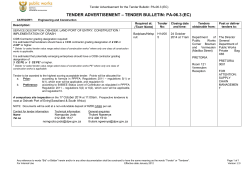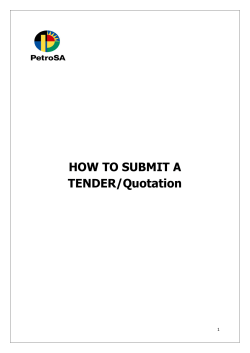
How to Tender Guidance 1: What is a PQQ?
How to Tender Guidance 1: What is a PQQ? PQQ stands for “Pre-Qualification Questionnaire” PQQs are backward looking in that they look at historic evidence. Suppliers should provide details of similar work carried out over recent years. We need to assess whether a company has the relevant experience, resources and technical ability to carry out the categories of work or to provide the type and quality of service required. This will be evaluated according to the following criteria: o Capability (experience). o Capacity (volume/quantity). o Economic and financial standing (solvency/integrity). The purpose of the PQQ is to enable the Council to move from a long-list of suppliers to identifying a short-list. An example PQQ is available here 2: Where does the PQQ sit in the Tender Process? The PQQ is the first evaluation point in the tender lifecycle. Questions asked at PQQ stage give the Council confidence that organisations are suitably qualified for the opportunity and prepared for the following stages of the process 3: What is asked in a PQQ? Basic details of your company: The Council wants to know who it is dealing with e.g. company name, parent company details, VAT registration. References: Purchasers need to validate claims. References are a test of capability and capacity. Proof will often be sought from more than one client. Insurance: The Council will seek insurances for its protection should something go wrong. Financial Information: The Council needs evidence of solvency and to evaluate financial risk, including over-reliance. Social Value/Sustainability: The Council will seek to ascertain what sustainable social value outcomes can be delivered by the supplier. A social value approach recognises the importance of additional benefits beyond the direct function of the services/goods purchased, including social, economic and environmental benefits. For further information and guidance, see the Council’s Social Value Policy. We also recommend the Bulmer Foundation’s Evaluate! tool (http://www.bulmerfoundation.org.uk/projects/evaluate) , which guides businesses through how to demonstrate their social value outcomes. Equal Opportunities: The Council requires full supplier compliance with equal opportunity laws. You will be asked to detail and possibly provide evidence of how equality issues are included in your company's employment practices. For a summary of key equalities legislation and how it relates to your industry, see the Council’s Equality and Diversity web pages Health and Safety: The Council is committed to providing a safe and healthy environment for everyone it works with and for. Suppliers must provide information about their company's safety policies, operational safety procedures and risk assessments. For further Health and Safety information relevant to your sector, see the Guidance pages on the Health and Safety Executive website.( http://www.hse.gov.uk/guidance/) Business and Company Standing: These are statutory questions which all public bodies must ask. For further details, see the Public Services Contracts Regulations 1993 (http://www.legislation.gov.uk/uksi/1993/3228/contents/made). 4: What is a Tender? The tender is a formal document issued by the Council which sets out the detailed requirements of work to be done. Tenders are forward-looking in that they ask questions around how requirements will be fulfilled. The objective of the tender is to identify a bidder with whom to contract. 5: Responding to Tenders Plan your response: Thoroughly read all the tender documents (including T&C’s), at the earliest possible stage. If the tender is unclear, seek clarification. Know the tender timetable and deadlines. If relevant, plan for sub-contractor input to your tender response. Determine the evaluation methodology as early as possible. Know how to respond (labelling, formats, attachments and templates). Prepare and submit your response. Keep responses concise and to word limits where specified. Use affirmative language not conditional (‘subject to’; ‘however’; ‘might’ etc.). Prepare your own checklist and tick-off what you have completed. Keep up to speed with Council’s messages (e.g. tender amendments). How the Council might evaluate bids The Council first eliminates non-compliant tender responses so that the process can concentrate on compliant bids. Tenders are often evaluated by teams, with specific questions assigned to the relevant specialists (e.g. financial, technical). Tenders can be searched for consistency between sections. This is easier when responses are received electronically. There will be a scoring regime against which evaluators will mark responses. Evaluator comments are captured throughout the process. Audit trail. 6: Feedback If you have submitted a tender you are entitled to feedback on why your bid was, or was not, successful. You are also able to submit feedback on your experience of the Council’s tender process. Opportunities to do this will be built into the tender timetable.
© Copyright 2025





















